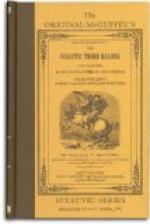Exercises.—What is described as beautiful? As strong? As glorious? Who is more beautiful than the rose, stronger than the lion, and more glorious than the sun? What is the book which we may all read? What should it teach us?
XLVII. THE HORSE. (128)
1. Uncle Thomas. Well, boys, I am glad to see you again. Since I last saw you I have made quite a tour, and at some future time will describe to you what I have seen. I promised at this meeting, however, to tell you something about animals, and I propose to begin with the horse. But I know that you like stories better than lecturing, so I will proceed at once to tell you some which I have gathered for you.
2. Frank. We never feel tired of listening to you, Uncle Thomas. We know you always have something curious to tell us.
3. Uncle Thomas. Well then, Frank, to begin at once with the horse.
4. In several parts of the world there are to be found large herds of wild horses. In South America the immense plains are inhabited by them, and it is said that ten thousand are sometimes found in a single herd. These herds are always preceded by a leader, who directs their motions; and such is the regularity with which they perform their movements, that it seems as if they could hardly be surpassed by the best trained cavalry.
5. It is extremely dangerous for travelers to meet a herd of this description. When they are unaccustomed to the sight of such a mass of creatures, they can not help feeling greatly alarmed at their rapid and apparently irresistible approach. The trampling of the animals sounds like distant thunder; and such is the rapidity and impetuosity of their advance, that it seems to threaten instant destruction.
6. Sometimes, however, they suddenly stop short, utter a loud and piercing neigh, and, with a rapid wheel, take an opposite course, and altogether disappear. On such occasions it requires great care in the traveler to prevent his horses from breaking loose and escaping with the wild herd.
7. In those countries where wild horses are so plentiful, the inhabitants do not take the trouble to raise others, but whenever they want one they mount upon an animal accustomed to the sport, and gallop over the plain toward a herd, which is readily found at no great distance.
8. The rider gradually approaches some stragglers from the main body, and, having selected the one he wishes, he dexterously throws the lasso (which is a long rope with a running noose, and is firmly fixed to his saddle) either over the wild horse’s head or in such a manner as to entangle his hind legs; and by the sudden checking of his own horse, he throws the captured animal over on its side.
9. In an instant he jumps off his horse, wraps his cloak round the head of the captive, forces a bit into his mouth, and straps a saddle on his back. He then removes the cloak, and the animal starts to his feet. With equal quickness the hunter leaps into his saddle; and, in spite of the kicking of the captive, keeps his seat, till, being wearied out with his efforts, the horse submits to the guidance of his new master, and is reduced to complete obedience.




